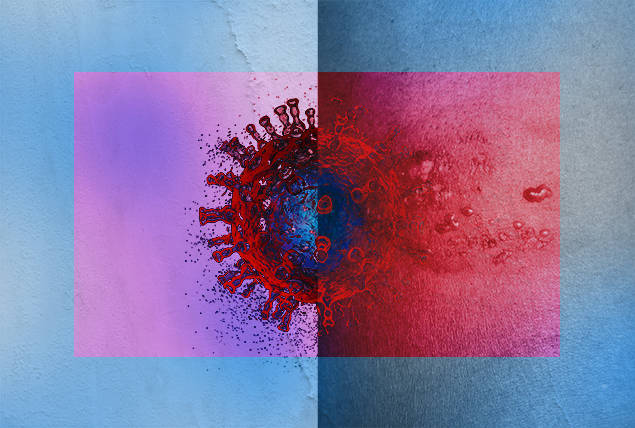Get to Know the Symptoms and Treatments for Genital Herpes

Genital herpes is a sexually transmitted disease (STD) caused by the herpes simplex virus (HSV). It can create blisters or sores around the site of infection.
Both the HSV-1 and HSV-2 strains of the virus can cause genital herpes, and they closely resemble each other. The main differences are that HSV-1 recurs less frequently and doesn't asymptomatically shed as much as HSV-2. Asymptomatic shedding occurs when the virus is infectious and can be passed to someone else without any symptoms to indicate it.
Genital herpes is transmitted through sexual activity and skin-to-skin contact, with male-to-female intimacy and anal sex being the biggest risks. It can also be passed through the use of sex toys.
Symptoms of genital herpes
Much of the world's population has either genital (500 million people) or oral herpes (billions of people). Many of them either aren't aware of it or don't present with symptoms. However, it is important to know what genital herpes can look like in case you do become symptomatic or other sexually transmitted infections (STIs) are present.
"Herpes sores are small, with a diameter of about 1 to 3 millimeters. They may appear as blisters and can be quite painful," said Peter Leone, M.D., a professor of medicine in the division of infectious diseases at the University of North Carolina School of Medicine in Chapel Hill.
Symptoms of genital herpes include the following:
- Red or white bumps around the genitals
- Itching in the genital area
- Pain in the genital area
- Sores or blisters
- Small genital scabs
- Pain while urinating
Diagnosis and testing
"The test for herpes is not one that is often done, as it can be positive but an outbreak never comes, so it is not helpful," said Emily Rymland, D.N.P., F.N.P.-C., a nurse practitioner and HIV specialist at Nurx, a telemedicine company based in San Francisco.
However, testing may be necessary if you do show symptoms.
"If there is a suspected outbreak, please be seen by your local provider and get a true diagnosis," Rymland said.
It is also important to rule out other health problems, including other STIs that have similar indicators to herpes or may not show signs.
"Herpes antibodies can be tested for in the blood. [It] can also be identified by taking swab samples from active sores," said Victor Sun, M.D., a family medicine doctor in Glendale, California, and a medical consultant with Chicago-based SuperPill.
Who do you see for herpes treatment and when?
If you suspect you have any type of STI, it is important to abstain from any kind of sexual activity until you are tested. Some infections can be cured, while others can be managed or made less contagious with help from healthcare professionals.
Aside from seeing your provider, you can order tests online or visit a sexual health clinic, such as Planned Parenthood, if you have concerns about genital herpes. Providers usually cover STD testing under "preventive medicine."
Some family planning clinics offer low- or no-cost testing for people who are eligible.
Treatment options and side effects
The medications for herpes can help you manage the virus, but it cannot be cured.
"Genital herpes is treated with antiviral medications that target the herpes virus, such as valacyclovir or acyclovir," Sun said.
The common side effects of antivirals can include diarrhea, dizziness, headaches, nausea, photosensitivity, skin reactions and vomiting.
As antivirals are not curative, herpes lesions may return on another occasion, especially when your immune system is weakened, Sun said.
Circumstances that can trigger or worsen a genital herpes outbreak include the following:
- Sunbathing or sunbeds
- Tight clothing
- Sex that creates genital friction
- Smoking
- Alcohol
- Sickness
- Stress
- Menstruation
- Genital surgery
- A weakened immune system
Some of these factors are avoidable and others aren't, so it is important to look after yourself whether or not you are symptomatic.
A few ways to manage an outbreak, if one occurs, include:
- Cleaning sores with saltwater to prevent infection
- Soothing the pain by using an ice pack
- Applying painkilling cream or petroleum jelly to sores
- Pouring water over the area during urination to relieve discomfort
- Avoiding touching the sores and washing your hands after you do
- Avoiding any clothing that rubs the sores
What are complications of undiagnosed herpes?
While there can be more significant complications caused by genital herpes, they are rare. One risky time comes at the end of a pregnancy.
"Genital herpes doesn't affect the ability to get pregnant, but it can be transmitted to a neonate via vaginal delivery," Leone explained, though he added the risk is small, especially in people who have had herpes for a number of years.
He recommended letting your obstetrician or midwife know you have genital herpes. If you have an outbreak during the delivery, they may recommend a C-section to avoid the baby becoming unwell.
Untreated herpes can cause complications to the brain, too. In rare cases, the herpes viruses can cause encephalitis and meningitis.
Related conditions
Some common sexually transmitted conditions can resemble or be transmitted alongside herpes viruses. These include mpox, syphilis and genital warts.
"Genital herpes is caused by herpes simplex type 2, and genital warts are caused by Human papillomavirus (HPV), the human papillomavirus," explained Jane Leonard, M.B.Ch.B., a general practitioner and cosmetic doctor based in London.
"Mpox and syphilis can both cause genital ulcers similar to genital herpes, but the presentation and accompanying symptoms generally are different," Leone said.
Leone highlighted some of the diagnostic differences between the conditions:
Syphilis
- Syphilis sores are painless, up to 3 centimeters in size and feel hard to the touch.
- Typically, syphilis presents as a single sore.
- Syphilis does not usually cause genital discomfort.
Mpox
- An mpox rash usually starts with a bump that fills with pus, which crusts over before an ulcer develops.
- A mpox rash can appear on many parts of the body, not just the genitals.
- A rash may be the only symptom for people infected with mpox, but they also may experience a fever and swollen lymph nodes.
- Mpox can present as a group of small sores or blisters.
- Mpox lesions have a characteristic central indentation with spots that tend to be a bit bigger than herpes lesions.
Genital warts
- Genital warts are typically skin-colored and appear raised or flat.
- These warts are usually painless and may have a cauliflower appearance.
Rymland recommended also being tested for HIV, gonorrhea and chlamydia if you are positive for any of the above conditions.
"The only way to protect yourself from genital herpes is to have protected sex and always use a condom," Leonard said. "If you've got a cold sore or herpes actively, avoid sex until all lesions have healed."


















